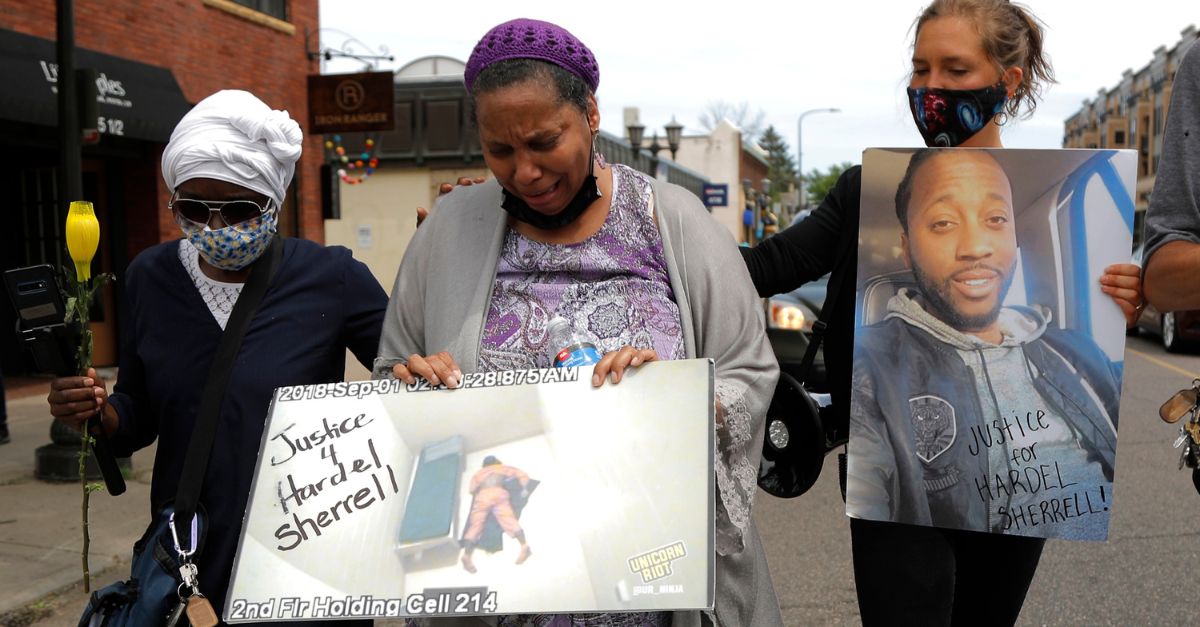
Del Shea Perry, second from left, mother of Hardel Sherrell who died from a medical condition in a Minnesota prison, walks with supporters while marching during a protest near the St. Paul, Minn. governor’s mansion Saturday, June 6, 2020. (AP Photo/Julio Cortez)
A nurse at a county jail in Minnesota is facing a manslaughter charge nearly six years after an inmate under her care died in a case that’s already resulted in a $2.6 million lawsuit and a new law in the victim’s name to ensure something like that never happens again.
Michelle Rose Skroch, now 37, is facing charges of second-degree manslaughter culpable negligence and two counts of felony criminal neglect, one for “knowingly depriving” inmate Hardel Sherrell of medical care and the second for doing so for an “extended period of time.” A criminal complaint says the 27-year-old Sherrell was booked into the Beltrami County Jail on Aug. 24, 2018. While his blood pressure was high, he was otherwise in good condition in his initial health screening. He had a history of high blood pressure and a recent incident of respiratory failure, the complaint said.
More from Law&Crime: ‘The victim’s face is broken’: Patient viciously attacks nurse for no apparent reason, likely blinding her for life, cops say
Three days after arriving at the jail, Sherrell began complaining of chest pain and said his fingers on his left hand were tingly. Doctors performed an EKG and gave him ibuprofen, Tylenol and an anti-anxiety medication. Sherrell also stated he had stopped taking his blood pressure medication in January 2018.
Sherrell’s condition continued to worsen over the ensuing days and kept falling out of his bunk bed and was unable to stand up. He said he was unable to feel his legs. A nurse went to check on him on Aug. 31, 2018, and found him lying on a mat in his cell and not able to move. His mouth also was drooping and his speech was slurred.
A jail doctor opined that Sherrell may be suffering from Guillain-Barré Syndrome, a rare autoimmune disorder affecting the peripheral nervous system. Sherrell went to the hospital where an emergency room physician diagnosed him with “malingering and weakness” as he was able to move his legs. They sent him back to jail after an MRI found no abnormalities, the complaint said. The ER doc instructed him to return to the hospital if he had a fever, signs of stoke and/or worsening weakness.
Skroch, who worked for MEnD Correctional Care, LLC which was contracted to provide medical services at the jail, came to work on Sept. 1, 2018, and was advised about Sherrell’s condition. When she went to see him, she allegedly just stood at his cell door and “never conducted a standard, basic nursing assessment.” She told Sherrell to “get up and walk” and that “there was nothing wrong with him and he could get up and walk if he wanted to,” according to the complaint. Sherrell “pleaded” for medical attention but Skroch allegedly said she “would not bargain with him.”
The defendant never collected vital signs or other physical examinations despite him being unable to eat, drink or go to the bathroom on his own, cops allege. He fell out of his cot six times in two hours, per the complaint.
Skroch returned to work on Sept. 2, 2018, and found correctional officers trying to bathe him. Instead of helping, the nurse started “basically screaming at [Sherrell] telling him he’s faking” his illness, the complaint said. She did not take vital signs nor perform any medical or neurological assessments.
She reportedly told the jail doctor that Sherrell’s condition was slightly improved and he was doing better than the day before. Per the complaint, Skroch later that day noted that the inmate was sleeping “comfortably” and had “no distress in his breathing.” However surveillance video reportedly showed Sherrell taking rapid, shallow breaths, prosecutors wrote. She allegedly told jail guards that Sherrell was “perfectly fine.”
Correctional officers found Sherrell unresponsive around 4:46 p.m. and doctors pronounced him dead shortly thereafter. An autopsy determined he died of pneumonia and cerebral edema, which is swelling of brain tissue. A outside pathologist labeled the cause of death as complications from Guillain-Barré Syndrome.
More from Law&Crime: ‘It takes everything in me not to start s—‘: NICU nurse accused of breaking bones of premature infants denied release after text messages revealed
A correctional health expert who reviewed the case said Skroch failed at “the most basic nursing care” such as taking Sherrell’s vitals or other basic medical assessments. She had enough education and experience to know something was seriously wrong with the inmate, the expert reportedly determined.
“He concluded that ‘[t]he failure to obtain any vital signs on a critically ill patient over two days is such a tremendous breach in the standard of care that it is tantamount to an abandonment of the most basic professional responsibilities of a nurse,’” prosecutors wrote.
Had she treated the patient, he likely would have survived, according to medical experts.
Sherrell’s mother sued and won a $2.6 million settlement against the county and MEnD, according to the Minnesota Star Tribune. State lawmakers passed the “Hardel Sherrell Act” that gives the Department of Corrections more oversight over county jails, local NBC outlet KARE reported. Skroch’s nursing license has since been revoked, according to the TV station.
Cops arrested Skroch on Friday. She has a court date scheduled for April 11.
Love true crime? Sign up for our newsletter, The Law&Crime Docket, to get the latest real-life crime stories delivered right to your inbox.



